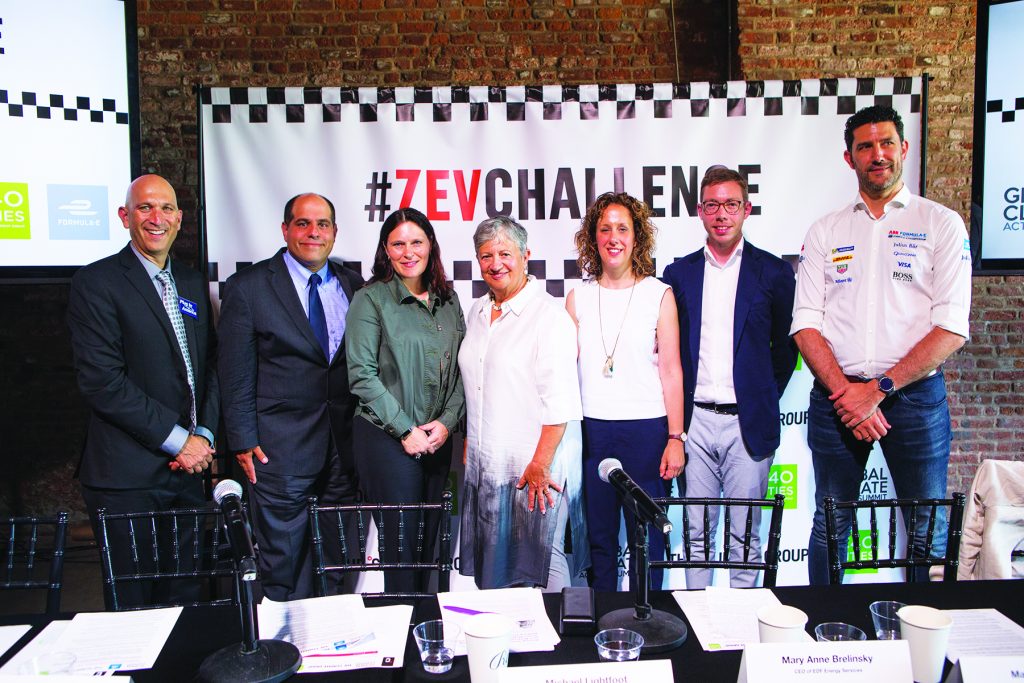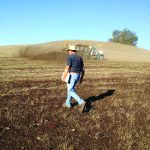
CARB Chair Mary Nichols (center) at the kickoff for the Zero Emission Vehicle Challenge on July 10 in New York. Photo courtesy The Climate Group.
In the wake of the news that California has already achieved its 2020 greenhouse gas emissions-reduction target, San Francisco will host the Global Climate Action Summit from September 12 to 14. By the time the conference wraps up, participants will have shared strategies and successes in addressing climate change, set new goals, and issued challenges to their peers around the world in five key areas: Healthy Energy Systems, Inclusive Economic Growth, Sustainable Communities, Land and Ocean Stewardship, and Transformative Climate Investments.
According to Nick Nuttall, communications director for the event, two years ago the United Nations acknowledged the state’s leadership on climate change with a request to hold a Global Climate Action Summit in California; Governor Jerry Brown agreed and San Francisco’s late mayor Ed Lee enthusiastically offered his city as a location. The city will be hosting the September 12 kick-off event, “Cities4Climate: The Future Is Us,” held by two international coalitions of local governments, the C40 Cities Climate Leadership Group and the Global Covenant of Mayors for Climate and Energy.
Nuttall emphasized that we are on an accelerating timetable to create answers to climate change. The Paris Climate Accord set a clear goal, which Nuttall described as “pollution so low by 2050 that the earth can handle it.” This requires decreasing greenhouse gas emissions to limit the global temperature increase to no more than 1.5 degrees Celsius above pre-industrial levels. Nuttall warned, “2020 is on the radar — it’s about that date when emissions should peak and begin to decrease if we’re to reach the goal — but we’re still off-track for that D-Day, Destiny Day.”
The summit is envisioned as an opportunity to gather momentum as 2020 approaches. State and regional officials, investors and CEOs, and other influential leaders are expected to partner in new commitments — creating support for national leaders to make changes in their climate plans and set new goals at the next summit, to be convened in New York in September 2019 by the UN Secretary General. “Paris got done because of CEOs, governors, and other interests building the confidence of national governments,” Nuttall explained.
This bottom-up approach to policy implementation allows local authorities to spark broad action through mutual commitments. For example, the City of San Francisco announced in April that it was joining 25 cities worldwide in a pledge spearheaded by C40 Cities to reach net-zero greenhouse gas emissions by 2050. As Debbie Raphael, director of the San Francisco Department of the Environment, emphasized at the time, “When cities lead, states and nations follow.” More details of the plan will be released during the upcoming summit, when San Francisco will also be a key player in the event’s official Zero Waste Challenge.
The Zero Emission Vehicle Challenge is another one expected to draw attention at the summit, with the California Air Resources Board having thrown its support behind this push to accelerate the adoption of electric vehicles around the world. “We call on all manufacturers to join us in this historic transformation, to be leaders in the race that will leave old-style, combustion-driven, inefficient, pollution-spewing engines in the dust,” said CARB Chair Mary Nichols at the challenge’s July 10 kickoff in New York.
Also on the air quality front, the Bay Area Air Quality Management District will hold an event at its San Francisco headquarters on September 12 intended to challenge summit participants to go “diesel-free by ’33.” And the following evening, the agency will hold a marketplace to showcase promising climate technology to potential users.
Although the main summit events and other high-level sessions will be invitation-only for officials and industry leaders, residents of the region can follow much of the proceedings live on YouTube, Facebook, and Twitter. They can also participate in a wide variety of “affiliate events,” many of them free. Local environmental organizations, agencies, and businesses are sponsoring activities, speakers, and workshops, which are listed on the summit’s community participation page, thehumsum.org. This site is also the place where local volunteers can sign up to help out — approximately 500 people are needed, particularly those who speak multiple languages — and where organizations can list needs or resources, such as meeting space.
Affiliate events start before the summit even gets going — for example, San Francisco’s annual Green Film Festival is September 6-13, and the “RISE for Climate, Jobs, and Justice” People’s Climate Movement March will be held on September 8 in San Francisco. And one public event has already begun: “Gravity of Today: Visions of Tomorrow,” an exhibit of digital art examining the impact of climate change on people and the environment, opened on July 14 and runs through October 21 at the San Francisco Library.
Those in the food business can get tickets for “Climate Friendly Cuisine: Food Service Guidance and Best Practices for a Healthy Planet” on September 11 at LinkedIn headquarters. The all-day event is co-sponsored by the Air District, whose spokesperson Lisa Fasano explained, “One of the largest impacts of greenhouse gases is from food production, food waste, and diet.” Attendees will learn about specific, practical steps that businesses and institutions such as restaurants, hospitals, and corporate campuses can take to reduce their carbon footprint, as topics include “plant-forward meal planning,” sustainable sourcing, and minimizing food waste.
Also on September 11, the Women’s Environmental and Climate Action Network International will sponsor the Women’s Assembly for Climate Justice from 1:00 to 8:30 p.m. at The Green Room on Van Ness Avenue. Speakers include leaders of indigenous groups, scientists, and activists. A list of calls to action from the assembly will be presented the next day to global summit leaders.
Concurrently with the summit, representatives from many organizations in the Bay Area will participate in a free speakers series at the Presidio Officer’s Club. The first session will feature speakers already engaged in climate change response, including representatives of Oakland’s As You Sow, San Francisco-based E2 and 10Power, Santa Rosa’s Pepperwood Preserve, San Francisco restaurant The Perennial, and ZeroFoodPrint, which includes many local restaurants. Other sessions will feature innovations in design that are in or past the proof of concept stage, with speakers from Sausalito’s Project Drawdown, San Francisco’s Buckminster Fuller Institute and Bioneers, and the Center for Ecoliteracy in Berkeley. Final discussions will focus on “vision, messaging, and establishing a cohesive narrative.”
At the conclusion of the conference, the United Nations Development Programme, Pathway to Paris, and 350.org will present a public concert at Masonic Auditorium, headlined by Patti Smith and Bob Weir.
All of these events are a small sampling of what the region will be offering to enhance the discussions and amplify the impact of the decisions made by world leaders attending the summit. The region has a rich and diverse network of organizations, businesses, and agencies focused on climate change, and Bay Area environmental leaders, like their counterparts around the world, are already taking crucial steps to bring the vision to reality.
They know that reversing climate change requires more than simply turning the top of Salesforce Tower green and hosting a conference. It means attending to lower-profile grassroots efforts, like ecological nonprofit Matter of Trust collecting hair from salons and barbershops to make storm drain filters and skimmers for oil spills, or restaurants educating patrons to value carbon-neutral menus. The Global Climate Action Summit will spotlight the global leaders, but it will also showcase the many ways in which one region is already moving the world in a sustainable direction.
Leslie Stewart covers air quality and energy for the Monitor.

